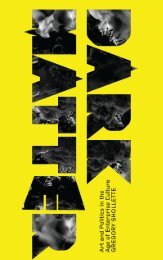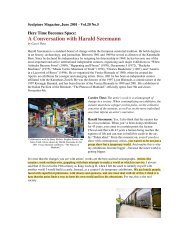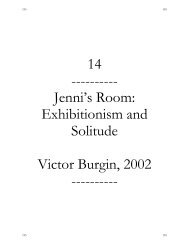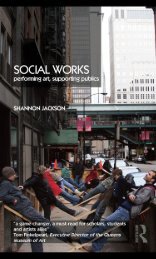Untitled
Untitled
Untitled
Create successful ePaper yourself
Turn your PDF publications into a flip-book with our unique Google optimized e-Paper software.
Privatizations, or Artificial Paradises of Post-Communism<br />
The term that without a doubt best characterizes the processes that have been<br />
taking place since the abdication of the Communist regime in Russia, and in<br />
Eastern Europe generally, is privatization. The complete abolition of private<br />
ownership of the means of production was seen by the theoreticians and<br />
practitioners of Russian Bolshevism as the crucial prerequisite to building first<br />
a Socialist and later a Communist society. Total nationalization of all private<br />
property was the only thing that could achieve the total social plasticity that<br />
the Communist Party needed to obtain a completely new, unprecedented<br />
power to form society. Above all, however, this meant that art was given<br />
primacy over nature—over human nature and over nature generally. Only<br />
when the “natural rights” of humanity, including the right to private property,<br />
were abolished, and the “natural” connections to origin, heritage, and<br />
one’s “own” cultural tradition severed, could people invent themselves in a<br />
completely free and new way. Only someone who no longer has property is<br />
free and available for every social experiment. The abolition of private property<br />
thus represents the transition from the natural to the artificial, from the<br />
realm of necessity to the realm of (political and artistic) freedom, from the<br />
traditional state to the Gesamtkunstwerk. The great utopians of history, such<br />
as Plato, More, and Campanella, had viewed the abolition of private property<br />
and associated private interests as a necessary prerequisite for the unconstrained<br />
pursuit of a collective political project.<br />
The reintroduction of private property thus represents an equally crucial<br />
prerequisite for putting an end to the Communist experiment. The disappearance<br />
of a Communist-run state is thus not merely a political event. We<br />
know from history that governments, political systems, and power relations<br />
have often changed without having substantial effects on private ownership<br />
rights. In such cases, social and economic life continued to be structured<br />
according to civil law even as political life was being radically transformed.<br />
With the fall of the Soviet Union, by contrast, there was no longer a valid<br />
social contract. Enormous territories became abandoned wildernesses as far







